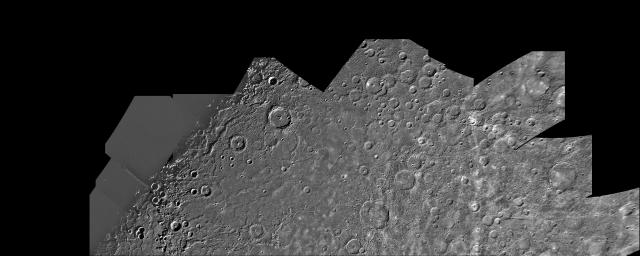
|
Mercury: Photomosaic of the Shakespeare Quadrangle (Northern Half) H-3
- Click the image above for a larger view
- Full-Res JPEG (9999 x 4000) (3.9 MB)
- Full-Res TIFF (9999 x 4000) (22.2 MB)
Caption:
This computer generated photomosaic from Mariner 10 is of the northern half of Mercury's Shakespeare Quadrangle, named for the ancient Shakespeare crater located on the lower edge to the left of center. This portion of the quadrangle covers the geographic region from 45 to 70 degrees north latitude and from 90 to 180 degrees longitude. The photomosaic was produced using computer techniques and software developed in the Image Processing Laboratory of NASA's Jet Propulsion Laboratory. The pictures have been high-pass filtered and contrast enhanced to accentuate surface detail, and geometrically transformed into a Lambert conformal projection.
The illuminated surface observed by Mariner 10 as it first approached Mercury is dominated by craters and basins. In marked contrast to this view, the surface photographed after the flyby exhibited features totally different, including large basins and extensive relatively smooth areas with few craters. The most striking feature in this region of the planet is a huge circular basin, 1300 kilometers in diameter, that was undoubtedly produced from a tremendous impact comparable to the event that formed the Imbrium basin on the Moon. This prominent Mercurian structure in the Shakespeare and Tolstoj quadrangles (lower left corner of this image), named Caloris Planitia, is filled with material forming a smooth surface or plain that appears similar in many respects to the lunar maria.
The above material was taken from the following publication... Davies, M. E., S. E. Dwornik, D. E. Gault, and R. G. Strom, Atlas of Mercury , NASA SP-423 (1978).
Background Info:
The Mariner 10 mission was managed by the Jet Propulsion Laboratory for NASA's Office of Space Science.
Cataloging Keywords:
| Name | Value | Additional Values |
|---|---|---|
| Target | Mercury | |
| System | ||
| Target Type | Planet | |
| Mission | Mariner | |
| Instrument Host | Mariner 10 | |
| Host Type | Flyby Spacecraft | |
| Instrument | ||
| Detector | ||
| Extra Keywords | Crater, Grayscale, Impact, Moon | |
| Acquisition Date | ||
| Release Date | 1996-09-19 | |
| Date in Caption | ||
| Image Credit | NASA/JPL | |
| Source | photojournal.jpl.nasa.gov/catalog/PIA00066 | |
| Identifier | PIA00066 | |
